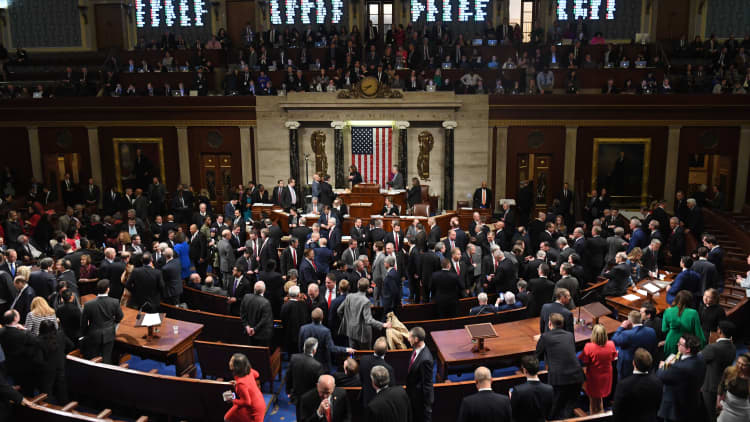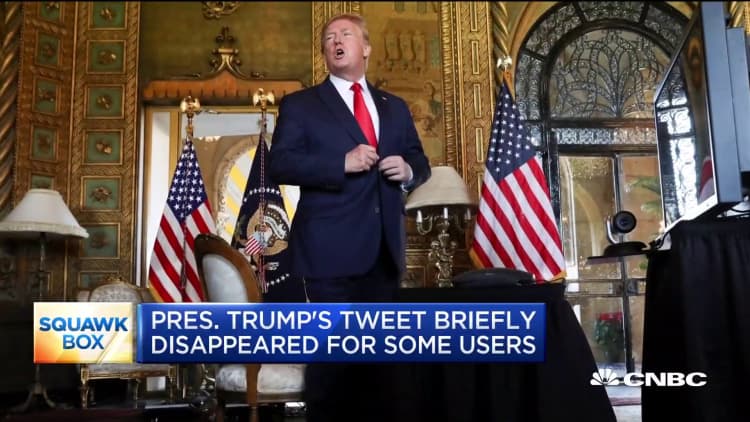A new report paints the most detailed picture yet of the internal strife surrounding the White House's freeze on hundreds of millions of dollars in military aid to Ukraine, which is at the center of President Donald Trump's impeachment in Congress.
The report from The New York Times, constructed from interviews with dozens of officials and previously unreleased documents, sheds new light on the key figures in the Trump administration's dealings with Kyiv.
It also probes Trump's own insistence that the congressionally mandated military aid package be withheld as he sought investigations into Vice President Joe Biden and his son Hunter, who worked on the board of a Ukrainian energy company while his father served under President Barack Obama.
On Tuesday morning, Trump repeated his accusations against the Bidens and his criticism of the impeachment process.
The president's latest tweet is sure to add some more fuel to the impeachment war: a clash between Republicans and Democrats over whether the rules of Trump's eventual trial in the Senate should allow witnesses to be heard or questioned.

Trump was impeached in the House on articles of abuse of power and obstruction of Congress related to his dealings with Ukraine. While the aid was being withheld, Trump asked Ukrainian President Volodymyr Zelenskiy to "look into" allegations against former Vice President Joe Biden and his son Hunter, as well as a conspiracy theory about Ukraine meddling in the 2016 U.S. election. Trump has denied any wrongdoing.
The aid was eventually released in September, after Trump learned of a whistleblower complaint about the call, which spurred Democrats to launch an impeachment inquiry. The White House has refused to cooperate with House Democrats' investigation.
No Senate Republicans have said they support Trump's impeachment. It's widely predicted that the GOP-majority chamber will not reach the two-thirds vote threshold required to convict Trump and remove him from office.
But the new details could provide leverage to the Democratic leaders who are pushing Senate Majority Leader Mitch McConnell, R-Ky., to accept their demands for the trial's rules.
Here are some new details from the Times' report:
'Expect Congress to become unhinged'
Officials in the White House budget office first learned of the push to withhold nearly $400 million in military aid to Ukraine in mid-June. That's when White House aide Robert Blair told acting White House budget director Russell Vought "we need to hold it up," officials briefed about the conversation told the Times.

The newspaper reported that more than a week later, acting White House chief of staff Mick Mulvaney emailed Blair: "Did we ever find out about the money for Ukraine and whether we can hold it back?"
The aide responded that it may be possible, but "expect Congress to become unhinged," according to the Times.
Both Mulvaney and Blair have been requested by Senate Minority Leader Chuck Schumer, D-N.Y., to testify during Trump's impeachment trial in the Senate. McConnell rejected Schumer's request — but he later said that the GOP hasn't ruled out the possibility of hearing witness testimony in the trial.
Top officials tried to convince Trump to release the aid
The Times reported that in late August, Trump was confronted in the Oval Office by Defense Secretary Mark Esper, Secretary of State Mike Pompeo and then-national security advisor John Bolton.
Each of the top administration officials tried to convince Trump to hand the aid package over to Ukraine.
But Trump said in response that he believed Ukraine was a corrupt country, and added that he did not believe the newly elected Zelenskiy's promises of reform, according to the Times.
"We are pissing away our money," Trump reportedly said.
Key official's role in the aid freeze caused friction
The core group of officials working to carry out the aid freeze had close ties to Mulvaney, the Times reported. Among them was Michael Duffey, a budget office appointee.
Duffey had been pressed by Mark Sandy, another budget office official, about why Trump had decided to put a hold on the aid package, according to the Times. No clear explanation had been given at that time.
Some of the money intended for Ukraine had been allocated by the Pentagon. Unlike the State Department, which controlled a separate chunk of the aid, the Pentagon had already notified lawmakers of its intent to spend the money.
So Duffey suggested that in order to allow the freeze to take place, Sandy should mention the withholding of that chunk of money in a footnote attached to a different budget document, the Times reported.
Sandy testified that he was concerned about that move and sought guidance from budget office lawyers.
Shortly after Trump's call with Zelenskiy, Duffey sent an email to the Pentagon directing that the aid money should not be spent.
"Given the sensitive nature of the request, I appreciate your keeping that information closely held to those who need to know to execute the direction," Duffey said in an email made public earlier this month.
Duffey failed to appear for a scheduled deposition as part of the House impeachment inquiry in early November. Schumer had also demanded that Duffey testify as part of the Senate trial.



